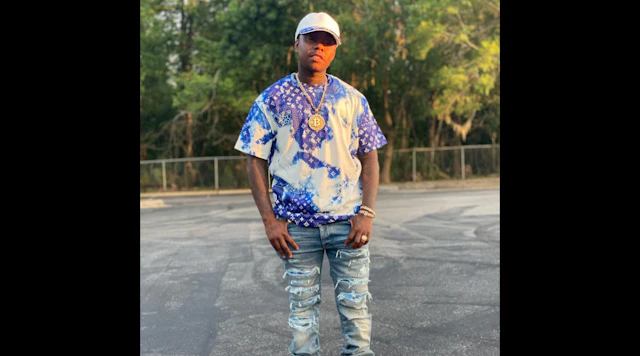
HRC Remembers Semaj Billingslea, “Larger than Life,” Black Transgender Man Killed in Jacksonville
by Jared Todd •

Loved ones remember Semaj as “larger than life.” He was a proud entrepreneur whose faith meant everything to him. On September 21st, at 33 years old, Semaj was shot and killed in Jacksonville, FL. Semaj’s death is at least the 31st violent killing of a transgender or gender non-conforming person in 2022 and the third known killing of a Black transgender person in Florida this year, following the deaths of Duval Princess in January and Nedra Sequence Morris in May. We say “at least” because too often these deaths go unreported — or misreported.
Semaj, born and raised in Jacksonville, graduated from Florida Youth ChalleNGe Academy before attending Florida State College, Jacksonville. He was a fan of Megan Thee Stallion and cared deeply about his friends. According to Pgh Lesbian Correspondents, Semaj is survived by family members, including his father and a daughter.
My heart goes out to Semaj’s loved ones as we grieve with them. We will continue to say his name and honor his life which was so full of love and joy. We are fighting every day for a world in which transgender people are treated with the human decency and dignity we deserve. It shouldn’t have to be said: Doing harm to someone just because of who we are is unimaginable and horrific. This epidemic of violence must end."
Unspoken Treasure Society Duval County stands with the loved ones and family of Semaj Billingslea, who loved life and lived it to the fullest. We will not let hate win and we demand justice."
The Jacksonville Sheriff's Office (JSO) reported one person dead from gunshot wounds outside a motel in Argyle Forest on the evening of September 21. Police found Semaj alive and was transported to the hospital, but died from his injuries. Currently, there is no suspect information and police are still investigating. Anyone with any information is encouraged to call the JSO non-emergency number at 904-630-0500 or CRIMESTOPPERS at 866-845-TIPS. Individuals can also email JSO at JSOCrimeTips@jaxsheriff.org.
More than 10,000 hate crimes in the U.S. involve a firearm each year, which equates to more than 28 each day, according to a 2020 report from HRC, Everytown for Gun Safety Support Fund, Giffords Law Center and Equality Florida titled “Remembering and Honoring Pulse: Anti-LGBTQ Bias and Guns Are Taking Lives of Countless LGBTQ People.” The report also notes a marked increase in anti-LGBTQ+ hate crimes, especially against transgender people. According to the 2017-2022 Transgender Homicide Tracker, the vast majority of three-fourths of confirmed homicides against transgender people have involved a gun, with Black transgender women accounting for 73% of all transgender gun homicide victims. Further, advocates saw a 43% increase in the formation of anti-LGBTQ+ hate groups in 2019.
In an injustice compounding this tragedy, Semaj was misgendered in some media and police reports. Anti-transgender stigma is exacerbated by callous or disrespectful treatment by some in the media, law enforcement and elected offices. According to HRC research, it is estimated that approximately three-quarters of all known victims were misgendered by the media and/or by law enforcement. In the pursuit of greater accuracy and respect, HRC offers guidelines for journalists and others who report on transgender people. HRC, Media Matters and the Trans Journalists Association have also partnered on an FAQ for reporters writing about anti-trans violence.
Tragically, interpersonal violence accounts for a significant number of fatalities against transgender and gender non-conforming people. A report by the HRC Foundation, “An Epidemic of Violence 2021,” found that between 2013 and 2021, approximately two-thirds of transgender and gender non-conforming people with known killers had their lives taken by an acquaintance, friend, family member or intimate partner. Intimate partners specifically accounted for over a fifth (21%) of all known perpetrators – and it is likely this may even be an undercount. To date, the relationship of the victim to the killer is still unknown for a plurality (43%) of all identified cases of fatal violence.
Additionally, according to the 2015 United States Transgender Survey, 54% of transgender and non-binary people have experienced some form of intimate partner violence in their life. Last year, HRC released a report, titled “LGBTQ Intimate Partner Violence and COVID-19,” that details the increased risk of interpersonal violence faced by LGBTQ+ people which has been exacerbated during the COVID-19 pandemic.
At the state level, transgender and gender non-conforming people in Florida are not explicitly protected from discrimination in employment, housing, education and public spaces. Florida does not include gender identity as a protected characteristic in its hate crimes law. Though we have recently seen some political gains that support and affirm transgender people, we have also faced anti-LGBTQ+ attacks at many levels of government this year. As of this writing, more than 340 anti-LGBTQ+ bills have been introduced in state legislatures across the country this year, more than 145 of which directly target transgender people.
We must demand better from our elected officials and reject harmful anti-transgender legislation at the local, state and federal levels, while also considering every possible way to make ending this violence a reality. It is clear that fatal violence disproportionately affects transgender women of color, especially Black transgender women. The intersections of racism, transphobia, sexism, biphobia and homophobia conspire to deprive them of necessities to live and thrive, so we must all work together to cultivate acceptance, reject hate and end stigma for everyone in the trans and gender non-conforming community.
More resources:
Learn more about the fatal violence cases that HRC is tracking where details are unclear. You may find a list of these cases here.
Watch this PSA campaign elevating stories of trans joy and love.
Join HRC's CountMeIn campaign to take action for transgender and non-binary people.
Read these guidelines and this FAQ for journalists to ensure greater accuracy and respect in reporting.
- Topics:
- Transgender
Love Conquers Hate
